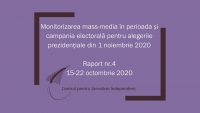CJI’S REPORT NO. 4 FINDS THAT FOUR OUT OF TEN TV STATIONS ARE MASSIVELY BIASED IN FAVOR OF SOME CANDIDATES
Four out of the ten TV stations monitored by the Independent Journalism Center (CJI) during the campaign for the presidential election of November 1, 2020, keep massively favoring certain presidential candidates. Another two TV stations have also been seen slightly favoring some candidates. These are some of the main conclusions of the fourth monitoring report covering the period of October 15 through 22, 2020, released by CJI on Monday, October 26.
According to the report, the public TV station Moldova 1 offered equal airtime to presidential candidates and presented them in most cases in neutral tones. Igor Dodon received mostly neutral—and once positive—coverage and appeared in positive contexts in the news reports about the work of the central and local governments.

Primul în Moldova, NTV Moldova, and Accent TV kept following similar editorial policies and differentiating between presidential candidates. Igor Dodon enjoyed massively favorable coverage from these stations, both by frequent appearances and the airtime allotted for direct interventions and by the positive tone of coverage. In addition, together, these TV stations transmitted over 60 positive materials about the work of the central and local governments, which were favorable to Igor Dodon. Igor Dodon was the only candidate who enjoyed frequent coverage in extended news reports that presented his election goals. The other candidates appeared in one or two news reports about the campaign each per TV station. Candidate Maia Sandu for the Action and Solidarity Party was more often mentioned than quoted on these TV stations—in other news reports than those about candidates’ election priorities and mostly with negative connotations.
Prime TV offered airtime to most presidential candidates in its newscasts, the coverage of candidates, political parties, and state agencies being mostly neutral. Igor Dodon and Violeta Ivanov, candidate for the Șor Political Party, enjoyed advantage due to lots of airtime they received, appearing in most news reports that covered the campaign and rallied support for them. Maia Sandu and Tudor Deliu, candidate for the Liberal Democratic Party of Moldova, appeared in other election news than those dedicated to candidates’ election priorities.
Publika TV had a relatively balanced behavior, offering airtime to most presidential candidates in its news reports and presenting them in a neutral light. Igor Dodon had most appearances and most airtime for direct interventions, especially in the news reports that covered the campaign and rallied support for him. The other candidates appeared in one news report each, where they talked about their election goals. Maia Sandu, Tudor Deliu, and Violeta Ivanov were quoted/mentioned in other news than those dedicated to their election goals.
Jurnal TV offered airtime to all presidential candidates, without clearly favoring or disfavoring any of them. The TV station treated candidates equally, informing about the electioneering meetings and election pledges of them all. The tone of coverage was mostly neutral. On TV programs, Igor Dodon had five negative appearances, and Violeta Ivanov, one.
Pro TV Chișinău offered balanced coverage, without clear biases in favor or against any of the candidates. Pro TV offered relatively equal airtime to all candidates, presenting them mostly in neutral tones and reporting on the election priorities of most of them in its newscasts. Igor Dodon and Renato Usatîi, candidate for Partidul Nostru, had one negatively presented appearance each.
TV8 allotted lots of airtime for news and programs directly or indirectly related to the election. The TV station did not report about candidates’ election goals and presented them in other news than those dedicated to election priorities. In most cases, presidential candidates, political parties, and the central government received neutral coverage. During TV programs, Igor Dodon had two appearances/mentions in negative contexts.
Televiziunea Centrală offered relatively equal airtime to all presidential candidates, who could talk about their election goals and received mainly neutral coverage. Violeta Ivanov had most appearances in a positive light, being also advantaged by positive news reports about the Șor PP.
By monitoring the media, CJI intended to inform the public about the behavior of the press during the election campaign and the access of election candidates to media coverage and to notify regulatory entities about the trends that could impact the performance of media outlets or compromise their capacity to offer trustworthy, detached, and pluralistic information.
CJI recommends the Broadcasters Council to use the monitoring reports to assess themselves and to see whether the monitored TV stations observed the right to full, objective, and trustworthy information.
All told, the monitoring covered ten TV stations: Moldova 1, Prime TV, Publika TV, Jurnal TV, NTV Moldova, Primul în Moldova, Accent TV, Pro TV, TV8, and Televiziunea Centrală. The broadcasters were selected by the following criteria: audience/impact (national, regional), type of media (broadcasting), ownership form (public, private), broadcasting language (Romanian, Russian).
This report was produced by the Independent Journalism Center as part of the project Media Enabling Democracy, Inclusion and Accountability in Moldova (MEDIA-M) implemented by Internews in Moldova with the support of the US Agency for International Development (USAID) and UKAID. The views expressed in it are those of the authors and do not necessarily reflect the position of the funders.
